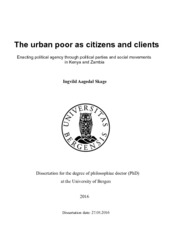| dc.description.abstract | How has political pluralism and increasingly more competitive elections affected the political agency of the urban poor in Kenya and Zambia, and why? This thesis compares the political mobilization of the urban poor by political parties and social movements in the two countries and shows that the urban poor exercise both citizenship and clientship (lack of political autonomy through contingent benefits) through these channels. In Kenya and Zambia, the poor constitute the majority of the urban population. Their livelihoods are characterized by illegality. They live in slums and work in the informal economy, often within trade. After the transition from patrimonial one-party rule to formally democratic regimes, the socio-economic grievances of these segments have become a rallying point for oppositional parties and social movement organizations (SMOs), offering promises of collective benefits. This explorative study is based on process-tracing within and across cases, and draws extensively on interview material from fieldwork stays. Zambia was considered a “most-likely” case for enhanced citizen-based agency for the urban poor: the country had a successful pro-poor, populist party, a legacy of cross-ethnic societal mobilization, and a substantial urban population. Kenya was considered a “leastlikely” case, and it was at the outset expected that the urban poor would be engaged primarily as clients. This was due to the predominance of multi-ethnic coalition building, a legacy of societal mobilization through ethnic brokerage, and a smaller urban population. The thesis concludes that through opposition parties and SMOs, the urban poor have achieved a hybrid form of political agency in both countries, constantly navigating between acting as clients and as citizens. Hence, the political processes in the two countries are converging. Hybrid agency is explained by two contradictory mechanisms for resource mobilization by these organizations. To challenge ethnoclientelist, incumbent governments, they need to generate legitimacy by (promises of) providing collective benefits to the urban poor, which reflects citizenship. However, they also have strong incentives to generate material resources by only providing contingent benefits, which reflects clientship. The study inductively identifies three types of power asymmetries that political parties and SMOs forge towards the urban poor which serve to clientify them: lack of information, lack of (collective) decision making power, and lack of freedom from coercion restrain the ability of the urban poor to engage as autonomous citizens. In the electoral sphere, hybrid agency has been created in the form of Latin American-style neopopulist party linkages (with an ethnic component remaining in the Kenyan case). In the civil society sphere, hybrid agency has been created in the form of “extraverted,” member-based movements. Regarding the interaction between party politics and social movements, opposition parties and SMOs have not developed strong institutional ties to each other. This can be attributed to the political parties’ reliance on clientelist resources, and the extraverted strategy of the SMOs. Furthermore, SMOs are found to operate on a broader scale than do opposition parties: slum-dwellers jointly versus tenants, or informal traders versus street vendors. Neopopulist strategies have been successful in garnering the vote of the urban poor in the capital cities. SMOs struggle to establish a sustainable resource base aggregated from their constituents, sometimes leading to the exclusion of more marginalized groups (tenants and street vendors). However, if SMO mobilization of the urban poor is seen as a threat to the clientele base of politicians, the latter will often seek to co-opt or fragment the SMOs. Hence, the agency of the urban poor in Kenya and Zambia is found to be of a hybrid character due to neopopulist parties, extraverted movements and political co-optation (hybrid movements). Consequently, the urban poor often find themselves in contradictory, even self-defeating, political processes when they attempt to engage in both structures. The findings indicate that in pluralist, competitive regimes in Africa where the “poor” constitute the urban majority, not only ethnicity, but also the socioeconomic interests of the urban poor are used for establishing clientelist linkages, often in combination with (promises of) programmatic benefits. | en_US |
